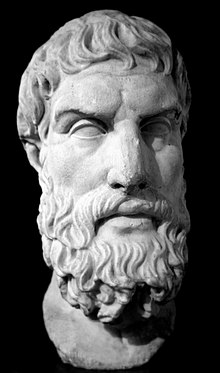


The Epicurus paradox is a logical dilemma about the problem of evil attributed to the Greek philosopher Epicurus, who argued against the existence of a god who is simultaneously omniscient, omnipotent, and omnibenevolent.
The logic of the paradox proposed by Epicurus takes three possible characteristics of a god (omnipotence, omniscience, and omnibenevolence—complete power, knowledge, and benevolence) and pairs the concepts together. It is postulated that in each pair, if the two members are true, the missing member cannot also be true, making the paradox a trilemma. The paradox also theorizes how if it is illogical for one of the characteristics to be true, then it cannot be the case that a god with all three exists.[1] The pairs of the characteristics and their potential contradictions they would create consist of the following:
Epicurus was not an atheist, although he rejected the idea of a god concerned with human affairs; followers of Epicureanism denied the idea that there was no god. While the conception of a supreme, happy and blessed god was the most popular during his time, Epicurus rejected such a notion, as he considered it too heavy a burden for a god to have to worry about all the problems in the world. For this reason, Epicureanism postulates that gods would not have any special affection for human beings and would not know of their existence, serving only as moral ideals that humanity could try to get closer to.[2] Epicurus came to the conclusion that the gods could not be concerned with the well-being of humanity through observing the problem of evil; that is, the presence of suffering on earth.

There is no text by Epicurus that confirms his authorship of the argument.[3] Therefore, although it was popular with the skeptical school of Greek philosophy, it is possible that Epicurus' paradox was wrongly attributed to him by Lactantius who, from his Christian perspective, while attacking the problem proposed by the Greek, would have considered him an atheist. There is a suggestion that it was in fact the work of a skeptical philosopher who preceded Epicurus, possibly Carneades. German scholar Reinhold F. Glei believes that the theodicy argument is from a non-Epicurean or anti-Epicurean academic source.[4] The oldest preserved version of this trilemma appears in the writings of the skeptic Sextus Empiricus.
Charles Bray, in his book The Philosophy of Necessityof1863, quotes Epicurus without mentioning his source as the author of the following excerpt:
Would God be willing to prevent evil but unable? Therefore he is not omnipotent. Would he be capable, but without desire? So he is malevolent. Would he be both capable and willing? So why is there evil?
N. A. Nicholson, in his Philosophical Papersof1864, attributes "the famous inquiries" to Epicurus, using words previously phrased by Hume. Hume's phrase occurs in the tenth book of his acclaimed Dialogues Concerning Natural Religion, published posthumously in 1779. The character Philo begins his speech by saying "Epicurus' ancient questions remain unanswered". Hume's quote comes from Pierre Bayle's influential Dictionnaire Historique et Critique, which quotes Lactantius attributing the questions to Epicurus. This attribution occurs in chapter 13 of Lactantius's "De Ira Dei", which provides no sources.
Hume postulates:
[God's] power is infinite: whatever he desires is executed. But neither man nor any other animal is happy. Therefore he does not want your happiness. His wisdom is infinite: he never errs in choosing the means to any end: but the course of nature tends to be contrary to any human or animal happiness: therefore it is not established for such a purpose. Throughout the entire history of human knowledge, there are no more certain and infallible inferences than these. In what point, therefore, do your benevolence and mercy remind you of the benevolence and mercy of men?
|
| |
|---|---|
| Philosophers |
|
| Concepts |
|
| Works |
|